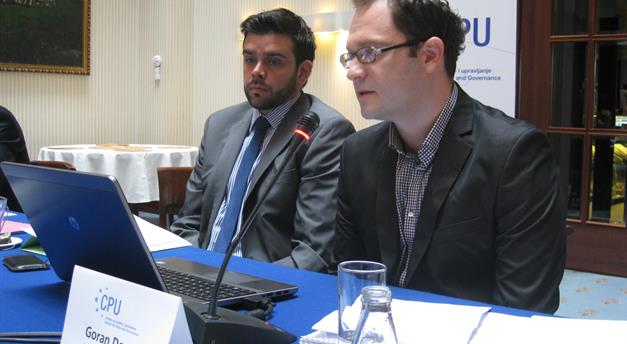
SARAJEVO, 4th November (FENA) – In order to introduce the public with the system of state aid in the EU, Centre for Policy and Governance (CPU) within the project "Implementation of the Law on State Aid BiH and better distribution of aid", prepared an analysis that contains a comprehensive overview of EU state aid system and proposed basic guidelines and policies in BiH.
Goran Dostić, lead researcher on the project "Implementation of the Law on State Aid BiH and better distribution of aid", within which was organized the roundtable today in Sarajevo "Reform and modernization of state aid as a precondition for economic development" presented the conclusions and recommendations contained in this document for the Agency FENA.
- In Bosnia and Herzegovina should be adopted Decree on criteria for the allocation of state aid, then strengthen the capacity to develop strategies and policies at all levels and to invest in the capacity of the Secretariat of State aid, which performs an effective state aid control-Dostić said.
EU action plan on state aid adopted in 2005. defines two basic goals: long-term reduction of subsidies share in GDP of every country and transition from vertical aid that targets specific industries to horizontal help, that includes small and medium businesses, research and development, investments in innovative technologies and environment programs.
Considering this, Dostić is pointing, that is necessary for BiH to apply for technical help projects of EU and other relevant institutions, and also to reduce overall amount of state aid i divert it into horizontal aid funds“.
- Also, there is a need to harmonize regulations on form of reporting on state aid and conduct terms of international agreements on relevant areas such as Energy Community Treaty, CEFTA etc.- said Dostić.
The research included data from the first inventory of state aid in BiH in 2011 and in 2012, which were adequate to compare with trends in EU.
Based on this, he claims that experiences from other countries speak of the importance of political will to implement the reform of the state aid.
- Usually as country becomes closer to EU the level of state aid would decrease, so it does not come as a surprise that BiH is at the beginning of this process and entire set of reforms is ahead of us – concludes Dostić.
This reform is a commitment in the process of preparing for the EU accession, bat alos an opportunity for the limited public resources to be directed in economically self-sustainable sectors which can actuate development and employment and improve competitiveness of the economy of BiH.
Lejla Dragnić, Coordinator of the project „Implementation of the BH Law on state aid and better distribution of grants“said that the aim of this project which lasts from April of 2013 to March of 2014. is to create a discussion on how to regulate the state aid in BiH.
- Through this process we intend to contribute to solutions that would direct state aid, subsidies in the areas which will create positive effects, where new employments will be created i new income, because in every country state aid takes large amounts of funds from the budget, but the question is what effect it will produce – points out Dragnić.
Participants of the round table were representatives of ministries, which are biggest donors of state aid, and guest who spoke of Croatia's experience in management of state aid was Marko Maček, deputy director of Croatian Competition Agency.
After Sarajevo, round tables organized by CPU on the subject „Reforming and modernizing the State Aid system to encourage economic development“, will be held in Banja Luka at the beginning of December and in Mostar, next year at the end of January.
Project „Implementation of the BH Law on state aid and better distribution of grants“ has been enabled by the generous support of the American people through the U.S. Embassy in Sarajevo, and policy development activities of the Centre for Policy and Governance and this project are supported by OSI Think Tank Fund.
(Fena)

